Basic AI Chatbot Pricing: A simple chatbot that can answer questions about a product or service might cost around $10,000 to develop.
Read More
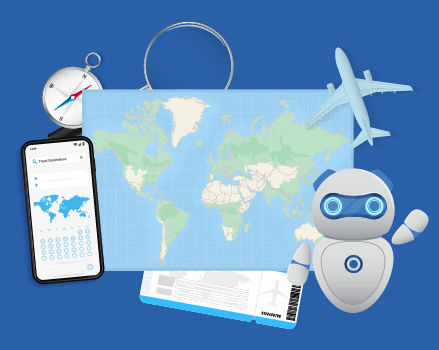
TL; DR

AI chatbot for travel planning apps are transforming how trips are researched, booked, and managed—faster, smarter, and with 24/7 support.

They help travel agencies automate customer queries, upsell services, and reduce support costs—without sacrificing personalization.

Investors are taking notice of AI travel assistant app development with integrating AI chatbot, as a market: the travel tech sector saw over $3.2 billion in funding in 2023, with AI-powered tools leading the charge.

Leading brands like Expedia, Hopper, and Booking.com are already using AI chatbots to increase bookings and improve user retention.
There’s this thing people do when you mention AI chatbots in travel.
They nod. Politely.
Then they say something like, “Oh yeah, we’ve got a chatbot too—it helps people find our phone number.”
Okay. Let’s pause right there.
Because if your chatbot’s biggest flex is being a glorified contact-us form, we need to talk.
AI chatbots for travel planning apps aren’t just robotic popups living in the corner of your applications. They’re intelligent, hard-working, always-on assistants that are quietly reshaping how trips are planned, booked, and managed. And they’re doing it better than many human reps—minus the caffeine breaks and shift changes. That is to say AI chatbots are 24*7 active.
Yet somehow, they’re still wildly underestimated. Especially in the travel space.
Travel agencies often think, “Well, our customers want human touch.”
Fair.
But guess what? Your customers also want replies at 11:48 PM about why their Rome tour package vanished. They want answers in their language, on their device, in seconds—and preferably before they’ve had time to get annoyed.
And here’s the kicker: In a recent survey of 1,000 travelers, more than 1 in 5 (22.8%) said they have used artificial intelligence (AI) to plan or assist with travel—a jump of over 40% since just September 2023.
That’s not a fringe tech trend anymore. That’s a signal.
Meanwhile, investors are busy chasing AI unicorns in fintech and healthtech—while quietly sleeping on a $2 trillion travel industry where service is everything and automation still feels like a novelty feature.
This blog is here to change that.
We’re going deep into how AI chatbots in travel planning apps are actually useful (and profitable). Not “sometime in the future” useful. We mean right now useful—for travel agencies trying to stay relevant, and for investors looking to catch the next real wave in travel tech.
From paper brochures to personalized bots—what a ride.
Let’s take a quick stroll down memory lane.
Once upon a time, planning a trip meant one of two things:
Charming? Maybe. Efficient? Not even close.
Then came the digital boom. Suddenly, everything was online. You could book your own flights, compare 27 hotel options, read reviews from someone who stayed in Room 209 three weeks ago—and yes, make the grave mistake of thinking you could plan a two-week European itinerary in one afternoon.
Which brings us to The Pain Point Era.
Because while digital made travel planning more possible, it didn’t make it easier.
More options meant more tabs.
More “research” meant more analysis paralysis.
And more platforms meant jumping between apps to book a flight, reserve a hotel, find a taxi, check the visa rules, and oh—did you pack the adapter?
Meanwhile, for travel agencies and tour operators, the rise of self-service tools meant fewer walk-ins and more customers expecting concierge-level support without paying concierge prices.
Here’s where AI chatbots start to enter the picture—not as a gimmick, but as a genuine fix for a bloated, fragmented experience.
Because unlike a static FAQ page or a generic booking flow, a chatbot can ask, “What’s your budget?” or “Are you traveling with kids?”—and adapt your trip based on your answers. It remembers your preferences. It works across time zones. It scales without needing more human staff.
So yeah. Travel planning has changed.
But more importantly, the expectation of what “good” travel planning looks like has changed. Fast, personalized, and low effort—that’s the bar now. And AI chatbots? They’re built to clear it.
Speaking so much about chatbot, of course we mean to integrate AI chatbot in travel planner app; therefore you may find it a more insightful read – AI chatbot integration.
What we are yet to discover is that “How travel apps use AI chatbots for personalized recommendations”. Let’s hop on that!
Partner with a team that’s been delivering AI projects for over two decades—on time & budget.
Book a Free Consultation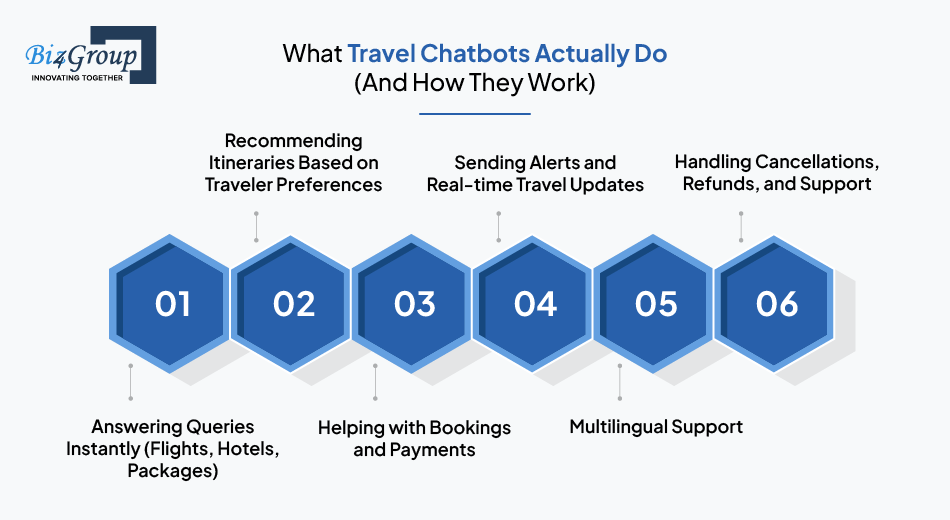
Not all chatbots are created equal—and here’s where the real value lies.
First, a quick (but important) distinction:
Not all chatbots are “smart.” Some are rules-based chatbots—simple bots that follow a fixed flow, like “If user says X, reply with Y.” Think of them as glorified decision trees.
AI-powered chatbots, on the other hand, use natural language processing (NLP), machine learning, and intent recognition to understand user inputs contextually—even when they’re vague, unstructured, or multi-layered.
In travel planning apps, this intelligence makes all the difference.
AI chatbots don’t just respond—they adapt.
If a traveler searches for budget flights to Spain and then asks about hostels in Barcelona, a smart chatbot connects the dots and starts making recommendations that actually make sense.
The more you interact, the more tailored it gets.
Unlike your overworked support team, bots don’t sleep. They’re there at 3AM when someone halfway across the globe is panic-Googling “weather in Iceland in May” and wondering if they packed wrong.
If you’re serving international clients—and let’s face it, who isn’t these days—your chatbot can engage in their language.
Try finding a human team that’s fluent in 14 languages and doesn’t mind late-night queries.
Stuff happens. Flights get delayed, plans shift, travelers change their minds. A good travel chatbot can:
Now, if you’re wondering how this all works, here’s the short version:
You don’t need to be a developer to appreciate how powerful that is.
All you need to know is: today’s bots are smart, scalable, and surprisingly good at making travel feel personal again.
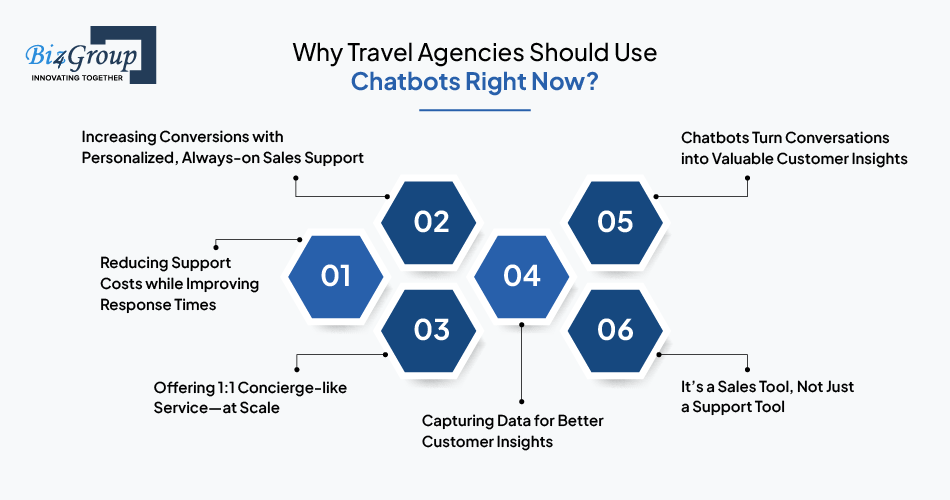
This isn’t a “nice to have” anymore. It’s your next competitive edge.
If you run a travel agency or tour operation, you’ve probably felt it:
This is where AI chatbots for travel planning apps stop being a tech trend and start becoming a business essential.
Let’s break it down.
Think of your chatbot as your fastest employee.
It doesn’t make people wait. It doesn’t get flustered. And it doesn’t forget to follow up.
When someone asks, “Do you offer honeymoon packages in Bali?” at 10:46 PM, the bot can not only say “yes,” but actually show them options. That’s a conversion moment you didn’t lose while sleeping.
And having spoken about chatbot’s role as customer service agent, explore how our team at Biz4Group can develop customer Service AI Chatbot for your travel planner app.
Chatbots don’t just answer questions—they guide users toward action.
“Here’s a 4-day Goa beach tour.”
“Want to add a dolphin cruise for ₹1,000 more?”
“Would you like to reserve now with a refundable deposit?”
This is conversational selling, and it works.
Mentioning of conversation, it is very relevant to explore how to build such conversational AI and the challenges associated with it.
Hiring, training, and managing a 24/7 human support team? Expensive.
Letting an AI chatbot handle 60–80% of your Tier 1 queries? Efficient and scalable.
That includes:
Your chatbot can remember preferences, past trips, dietary restrictions, travel styles.
“Hey Priya, ready for another girls’ trip? Last time you loved Barcelona—how about Lisbon this time?”
It makes the customer feel seen without adding to your to-do list.
Every interaction with a chatbot is a data point.
You’ll start seeing patterns:
Think beyond service. Chatbots can:
Bottom line:
AI chatbots let you serve better, sell smarter, and scale faster—without burning out your team or blowing your budget.
And honestly, your competition might already be doing it.
Create AI chatbot for travel planning app with experts who understand AI & travel industry—no templates, just tailored solutions.
Talk to Our ExpertsBecause theory is cute, but results get funded.
Alright. You’ve heard the pitch.
Now let’s look at the players who’ve already rolled the dice on AI chatbots—and are seeing serious returns.
These aren’t experiments. These are working models—backed by data, built for scale, and designed to make travelers say, “Whoa, that was smooth.”
Expedia’s integration with
Instead of bouncing between tabs to book flights, hotels, and activities, travelers can simply chat their way through a complete trip plan.
Why it works: It merges AI power with booking intelligence in a single UX flow. Travelers love it. Techies love it. Investors really love it.
Hopper doesn’t just help you book flights—it tells you when to book them.
Using machine learning, its chatbot notifies users when prices are expected to rise or drop—and even holds deals for you.
Why it works: The bot builds trust by saving users money—without upselling or fluff.
With travelers booking over 1.5 million nights every day, Booking.com needed scale.
Their travel planning app with AI chatbot now handles:
…all in over 40 languages!
Why it works: It keeps post-booking friction low—and customers calm—without overloading human agents.
Skyscanner’s chatbot lives inside Facebook Messenger, WhatsApp, and Alexa.
You can literally say, “Find me the cheapest flight to Italy next month,” and it does—filtering options, suggesting dates, and redirecting to bookings.
Why it works: It meets travelers where they already are—and speaks in natural language, not “dropdown logic.”
What ties all of these together?
They’re not just using chatbots as gimmicks. They’ve woven them into the core travel experience.
And that’s where the magic happens.
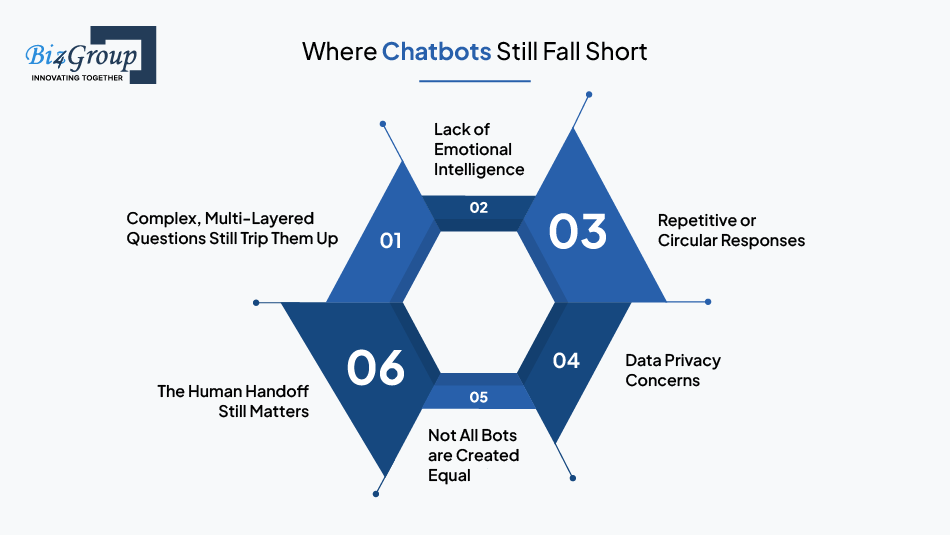
Because “AI-powered” doesn’t mean “problem-free.”
Alright, time for a reality check.
Yes, AI chatbots are impressive.
Yes, they’re transforming how travel businesses operate.
But let’s not pretend they’re flawless digital wizards who can do everything except fold your laundry.
They’ve got limits—and knowing where those limits are is crucial for anyone building, using, or investing in them.
Simple: “Can I change my hotel date?” → No problem.
Complex: “Can I change my hotel, but only if my flight gets delayed, and also apply my loyalty points, but I don’t want to lose my breakfast credit.” → Cue the bot meltdown.
Even the best AI struggles with context-heavy or multi-step queries.
They either misinterpret the question or give a vague, unhelpful answer—which is basically the digital equivalent of shrugging.
Travel can be stressful. Flights get canceled. Honeymoons go sideways.
And when someone’s frustrated, a cold, templated “I’m sorry to hear that” just doesn’t cut it.
Chatbots, even smart ones, lack empathy.
They can’t read tone, detect sarcasm, or handle someone who’s three time zones tired and just wants a refund now.
Sometimes, you just need a human who gets it.
Ever been caught in a chatbot loop where it keeps answering a slightly different version of the wrong thing?
“Sorry, I didn’t understand that.”
“Sorry, I didn’t understand that.”
“Sorry, I didn’t underst—”
Cool cool cool. Now where’s the exit?
This usually happens when bots don’t have enough training data or fallback rules to escalate issues gracefully. And it drives users nuts.
With great personalization comes great responsibility.
Travel chatbots often deal with sensitive info: passport numbers, payment details, trip preferences, even health restrictions.
And users are (rightfully) wary. One major data leak or misuse, and trust goes out the window.
For businesses, that means:
Let’s be real—some of the travel “chatbots” out there are barely smarter than a glorified contact form with a bad attitude.
If you’re not using natural language processing, integrated APIs, or continuous learning?
You’re not using a chatbot. You’re just wasting your customer’s time.
Even the smartest AI knows when to say, “Hey, let me get someone to help you.”
But not all bots do this well. Some don’t hand off at all. Others do it awkwardly—mid-convo, without passing the context, forcing the customer to start from scratch.
That’s a bad experience. And it kills trust fast.
So, are chatbots amazing? Yes.
Are they perfect? Absolutely not.
But the companies winning in this space know that AI should augment humans, not replace them—and they build for the blend.
Speaking of appropriate companies to cater to your needs, you may want to explore top chatbot development companies in USA, for that matter.
Automate bookings, support, and upsells with an AI chatbot that feels as human as your best agent—only faster.
Let’s Build It TogetherIf you’re going to outsource, go with a team that already knows how to build what you need.
By now, it’s clear that AI chatbots are making serious waves in the travel industry. But knowing you need one is only half the equation.
The other half?
Who’s going to build it—and build it right?
Because let’s face it: not every dev agency out there is equipped to handle smart, human-like, scalable chatbot systems. Especially the kind travel businesses need—where context, personalization, and fast decision-making are make-or-break.
Which brings us to Biz4Group.
Biz4Group isn’t just another software shop tinkering with bot templates. In one of our recent projects, our team of experts developed an advanced AI-driven chatbot for customer communication that wasn’t just functional—it was human-like. We’re talking:
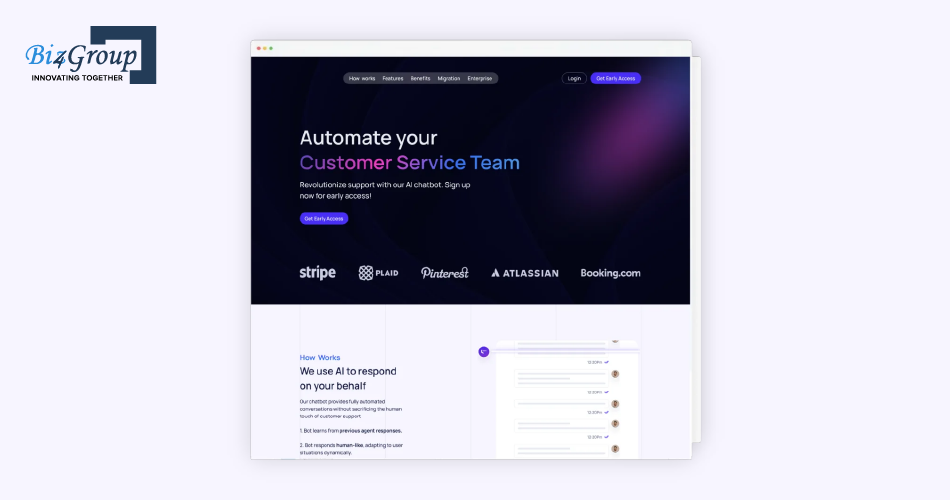
Source: Customer Service AI Chatbot
Exactly the kind of features a travel planner needs to manage complex user queries like:
“I’m planning a trip to Italy next June—can you recommend some places within a €1500 budget, but with direct flights only from Amsterdam?”
Travel businesses don’t operate in silos—and neither should your chatbot.
Biz4Group’s AI bot was designed with deep backend integrations, allowing it to plug into systems like:
So, if your travel app already uses platforms like Amadeus, Sabre, Stripe, or HubSpot—this team knows how to make it talk.
Travel apps handle sensitive data: passport info, payment details, itineraries, even medical preferences.
Biz4Group built their chatbot solution with a clear focus on:
That’s crucial if you're planning to roll this out globally—or handle booking spikes during seasonal campaigns.
While the project wasn’t travel-specific, the bot’s core capabilities—intent mapping, real-time query resolution, user-specific dialogue flow—make it a perfect fit for:
In short: you won’t need to explain the difference between a flexible fare and a non-refundable one—the team already knows how to build for complex industries.
Bottom line?
If you’re in the travel space and thinking about launching a chatbot—as one of the leading AI chatbot development company in USA, Biz4Group isn’t just an option. Our team is a smart, low-risk, high-ROI option.
Once you decide on to build an AI agent for travel planning app, of course, you would want to enquire on the cost to build the same. In case, if you’re planning to build your travel app from scratch, here is a helpful guide for you - AI Travel Planner App development cost. This would also include the cost to integrate AI chatbot to your travel planner app.
And no, this isn’t just another tech fad.
Let’s recap, shall we?
We’ve gone from the travel planning days of paper tickets and faxed itineraries…
To AI bots that can plan a two-week Europe trip while you’re waiting for your Uber.
That’s not a minor upgrade. That’s a full-blown revolution.
And right at the center of it all? AI chatbots—making travel faster, smarter, more personal, and infinitely more scalable.
They help travelers make decisions.
They help agencies close bookings.
They help teams avoid burnout.
They help businesses unlock data that’s been hiding in plain sight.
In short: they work.
Now, if you’re a travel agency or tour operator, you’ve got two options:
If you're an investor, this is your cue.
This isn’t about betting on hype. It’s about recognizing a growing demand inside a massive industry, where automation hasn’t even scratched the surface.
And if you're building or outsourcing chatbot tech—well, we just gave you a solid partner to talk to. (Cough Biz4Group.)
So yeah. Let’s build smart chatbot together!
Whether you’re a startup or an OTA giant, we’ll help you deliver smarter, faster, AI-driven travel experiences.
Start Your Project TodayAI chatbots simplify travel planning by offering personalized suggestions, managing bookings, and answering queries 24/7—all in real time. They handle everything from finding flights and hotels to adjusting itineraries and offering visa information. Instead of bouncing between ten tabs and two apps, users get tailored recommendations through a single chat, reducing friction and decision fatigue. It’s like having a travel agent in your pocket, minus the hold music.
Yes—smart chatbots can handle last-minute changes like flight delays, hotel cancellations, or itinerary shifts with surprising efficiency. They provide instant rebooking options, notify users about updates, and escalate to human support if needed. The key is integrating them with live data sources and booking engines. They won’t replace a crisis hotline, but for most changes, they’ll save time (and sanity) without a customer ever picking up the phone.
Absolutely. Chatbots aren’t here to replace your team—they’re here to support it. Think of them as your frontline assistants: they handle the routine stuff (FAQs, basic bookings, follow-ups), so your human staff can focus on complex or high-touch customers. It’s not either-or—it’s a blended model that improves efficiency, reduces burnout, and scales customer service without constantly hiring more people.
Travel chatbots can collect data like destination preferences, travel dates, loyalty status, and budget range to personalize the experience. They may also process payment or ID info depending on functionality. A well-built chatbot (like those developed by Biz4Group) follows strict data privacy protocols, including GDPR/CCPA compliance and secure encryption. Users must give consent, and businesses must prioritize transparency—especially in an industry where trust is everything.
It depends on the scope. A basic chatbot handling simple FAQs might cost a few thousand dollars, while a fully integrated, AI-powered travel planner with backend integrations, multilingual support, and personalization could range from $25,000–$100,000+. The good news? You don’t need to build it all at once. Start lean, test fast, and work with partners like Biz4Group who understand scalable, budget-aligned AI chatbot development for travel brands.
IN YOUR BUSINESS FOR FREE
Our website require some cookies to function properly. Read our privacy policy to know more.